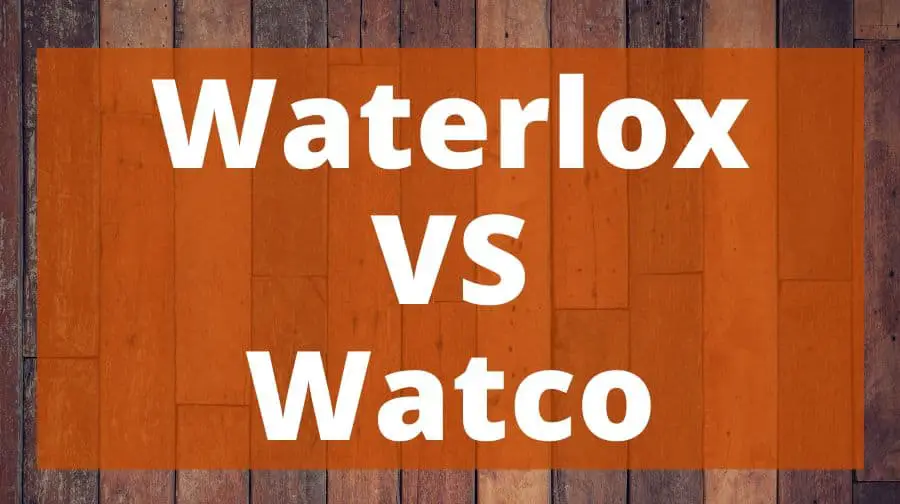
If you are looking for a new finish for your woodworking projects, you may wonder if Waterlox or Watco is the right choice for you. Both of these finishes have their pros and cons, and it can become tough to decide which one is right for your needs.
In this blog post, we will compare and contrast Waterlox and Watco. So that you can make an informed decision about which finish is best for you.
What Is Waterlox And What Are Its Benefits
Waterlox is a tung oil-based sealer, finish, and preservative for wood surfaces. It is unique in that it offers the benefits of both oil and varnish finishes. Waterlox can apply to indoor or outdoor wood surfaces including floors, countertops, doors, furniture, and trim.
Waterlox offers several benefits over other finishes:
– Waterlox penetrates deep into the wood grain to protect from within, unlike varnish which only forms a surface film.
– Waterlox is water, heat, alcohol, and scratch resistant.
– Unlike oil finishes, Waterlox will not darken with age or leave a sticky residue.
– Waterlox can apply in thin coats and dries quickly.
– Waterlox is safe for food contact surfaces.
Waterlox is a great choice for wood finishes because it is durable, beautiful, and easy to apply. If you are looking for a finish that will last for years and enhance the natural beauty of wood, Waterlox is the perfect choice!
What Is Watco And What Are Its Benefits
Watco is a wood finish brand that offers a number of benefits to its users. These benefits include a durable finish, easy application, and a wide variety of colors and styles to choose from. Watco also offers a warranty on their products, so you can be sure that you’re getting a quality product. Overall, Watco is an excellent choice for anyone looking for a high-quality wood finish.
How Do Waterlox Vs Watco Compare In Terms Of Price, Durability,
Ease Of Use, And Other Factors
Waterlox and Watco are two of the most popular brands of wood sealers on the market. But how do they compare in terms of price, durability, ease of use, and other factors? Here’s a look at Waterlox vs Watco to help you decide which is right for your needs.
Price: Watco is cheaper than Waterlox, but the price difference is not always significant.
Durability: Watco claims more durability than Waterlox. But there are no definitive studies to back up this claim.
Ease of use: Waterlox is easier to use than Watco because it does not require mixing and can apply with a brush or roller.
Other factors: Watco is available in more colors than Waterlox. But the latter may not leave behind a sticky residue.
Which Finish Is Right For You – Waterlox vs Watco
You decided to finish your woodworking project with a protective coating. But what kind of finish should you use? Waterlox or Watco?
Here’s a quick rundown of the two finishes and their key differences:
Waterlox is a resin-based sealer, while Watco Danish Oil is a blend of oil and resin.
Waterlox provides a more durable finish, while Watco Danish Oil penetrates deeper into the wood.
Waterlox is more resistant to heat and moisture, while Watco Danish Oil is better at resisting scratches and stains.
Is Waterlox Good For Countertops?
Waterlox is a suitable choice for countertops because it is durable, easy to clean, and has a natural look. It can also have a refinish if it ever gets damaged. Waterlox is a bit more expensive than other countertop options, but it is worth the investment.
So, if you’re looking for a high-quality countertop option, Waterlox is a superb choice. It will last for years and will always look fantastic! Plus, it’s easy to care for and can refinish if necessary.
Is Waterlox Better Than Tung Oil?
We get a lot of questions here about Waterlox as better than tung oil. Yes, it is. Here’s a quick rundown of the reasons why:
Waterlox is a much more durable finish than tung oil. It can withstand heat and water damage, and it won’t yellow or fade over time.
Waterlox is also much easier to apply than tung oil. It doesn’t require any special tools or skills, and it can apply in a few simple steps.
Finally, Waterlox provides a beautiful and natural finish that enhances the look of wood. It brings out the grain and color, and it adds a deep and rich luster.
Can I Use Waterlox Over Danish Oil?
Yes, you can use Waterlox as a sealer over danish oil. Danish oil is a penetrating oil, so it will not provide a durable surface that can withstand water and other liquids. Waterlox is a good option for a sealer because it is durable and waterproof. It can also be used as a topcoat over danish oil, which will provide more protection.
If you are going to use waterlox as a topcoat, make sure to apply it evenly and carefully. You don’t want to create any streaks or brush marks. Waterlox can also be applied with a wiping varnish technique, which will give you a more even finish.
Subscribe to Gunner Grey Furniture Fusion on YouTube
Does Waterlox Yellow Over Time?
Waterlox is a durable finish that will last for many years. However, it may yellow slightly over time due to exposure to sunlight. If you want to maintain the original color of your Waterlox finish, you can reapply it every few years.
Is Waterlox Better Than Polyurethane?
You may wonder about Waterlox if it is better than polyurethane. It depends on what you are looking for in a sealer or finish.
Here are some factors to consider when making your decision:
-Ease of Application: Waterlox is easier to apply than polyurethane. It can apply with a brush, roller, or sprayer.
-Drying Time: Waterlox dries faster than polyurethane. So you can apply multiple coats in a shorter period.
-Finish: Waterlox gives a more natural look to wood because it does not yellow over time like polyurethane can.
-Durability: Waterlox is more durable than polyurethane and can withstand high traffic areas better.
So, these are some things to consider when deciding between Waterlox and polyurethane.
How Many Coats Of Waterlox On Butcher Block
You decided to finish your butcher block countertop with Waterlox. It is an awesome product that will give you a stunning and durable finish. But how many coats do you need?
The number of coats you’ll need depends on a few factors, including the type of wood you’re using, the porosity of the wood, and the look you’re going for. In general, though, most butcher block countertops will need between three and six coats of Waterlox.
Subscribe to Dre Dan on YouTube



